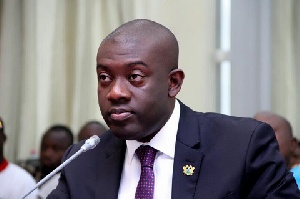Deputy Minister of Information and Member of Parliament (MP) for Ofoase-Ayirebi, Kojo Oppong Nkrumah, is the Member of Parliament (MP) with the largest following on social media (Facebook and Twitter), Odekro has said.
In their social media ranking of MPs compiled between 19 January and 14 February 2018, Odekro said the followers on the two social media platforms indicated that Mr Nkrumah has 402,700 followers.
His following is more than triple that of his closest contender at second position, Samuel Okudzeto Ablakwa, MP for North Tongu who has 81,200.
In third position is George Andah Nenyi, MP for Awutu Senya West with 32, 300 followers.
The fourth position was taken by Alhassan Suhuyini, MP for Tamale North with 25,900 followers.
MP for Kumbungu, Ras Mubarak placed fifth with 22,500 followers on Facebook and Twitter.
Meanwhile, Odekro has also revealed that there are more New Patriotic Party (NPP) Members of Parliament on social media who influence the public than their National Democratic Congress (NDC) compatriots.

The findings of the research indicates that 131 (47.6%) MPs in Ghana’s Parliament are on social media (Facebook and Twitter) out of the 275.
“Of the 131 MPs present on social media, 76 (58%) are affiliated to the NPP and 55 (42%) are affiliated to the NDC.
“NPP MPs have more influence on Twitter than NDC MPs with an average following of 79,365 compared to the NDC’s average following of 35,522,” Odekro stated.
The research also pointed out that all 131 MPs are on Facebook with about 10% on Twitter.
“Of the 131 MPs present on social media, 105 (80%) are men and 26 (20%) are women. In proportional terms, there are more women MPs (26/37; 70%) on social media against their men counterparts (105/238; 44%)
“Of the 131 MPs present on social media, 29 (22%) are between 24-40 years, 92 (70%) are between 41-60 years, and 9 (7%) are between 61-65 years;
“Generally, the tone of social media contents by both parties on average are largely partisan (35%) followed by information on constituency-related issues (31%), national issues (20%) and parliament related issues (14%),” Odekro explained.
According to the research, on average, the frequency of posts by MPs on social media is minimal. Also, contents shared are often informational and rarely interactive.
“Moreover, MPs hardly engage their online constituents on legislative and public policy related matters. Neither do they seek the views of their online constituents on crucial bills before Parliament.
“MPs’ contents on social media are more personal, than professional. Perhaps this is because majority of MPs manage their social media accounts directly. Only a few have outsourced this role to social media managers/Personal Assistants.
“It is also instructive to note that online communications of MPs are not regulated and there are no plans yet to archive their official online communications including their social media posts,” the results of the research added.
Odekro explained that the aim of the research is to inform Ghanaians about the social media presence of their MPs, examine the kind of content MPs share on their social media platforms and identify the most active MPs on social media.
Methodology notes from Odekro
Odekro constantly engages MPs of Parliament through its parliamentary monitoring and assessment project and other initiatives, thus it was able to fish out the social media accounts of some MPs easily without any major hurdle. For MPs we could not easily identify, most of whom were part of the 136 new MPs who entered the Seventh Parliament, we adopted the following steps in particular order:
1. Entered their names as captured in the Hansards and also in many other variations. If unsuccessful, we
2. Leveraged on the accessibility of their peers’ social media accounts to identify them. This of course depended on the privacy settings of the MP. If unsuccessful, we
3. Verified names on social media similar to the MP we seek to identify on the basis of content shared (legislative activities, constituency engagements, media engagements and other official assignments), relative regularity of online activity, tags by friends and stakeholders and general comments on posts.
4. We determined the ‘activeness’ of an MP by summing his or her Twitter and Facebook followers.
Among others, one potential limitation of our methodology could be failure to capture MPs using aliases or alternative names on social media. But if this limitation is allowed to hold, it will constitute a serious affront to the representative function of MPs. Odekro has constantly maintained the practical benefits of constituency relations in the sense that MPs who establish two-way communication with constituents are better positioned to explain or defend new policies, laws and challenges in prosecuting certain items on the government agenda. It is in an MP’s own political interest to maintain good constituency relations (both online and offline), as an MP who is considered inaccessible to his constituents risks losing his or her seat. (Pg. 34; Odekro report on the Sixth Parliament).
General News of Monday, 19 February 2018
Source: classfmonline.com

















